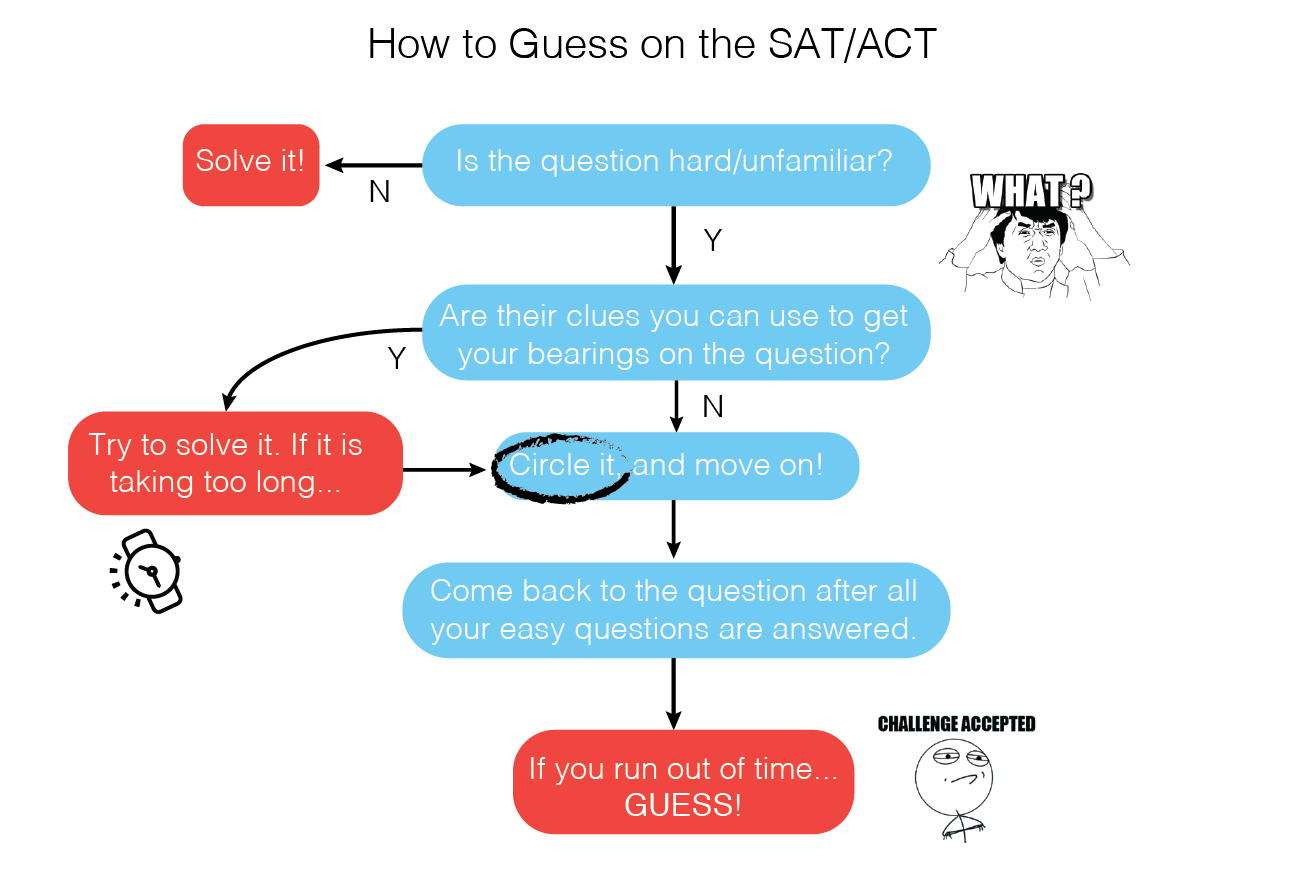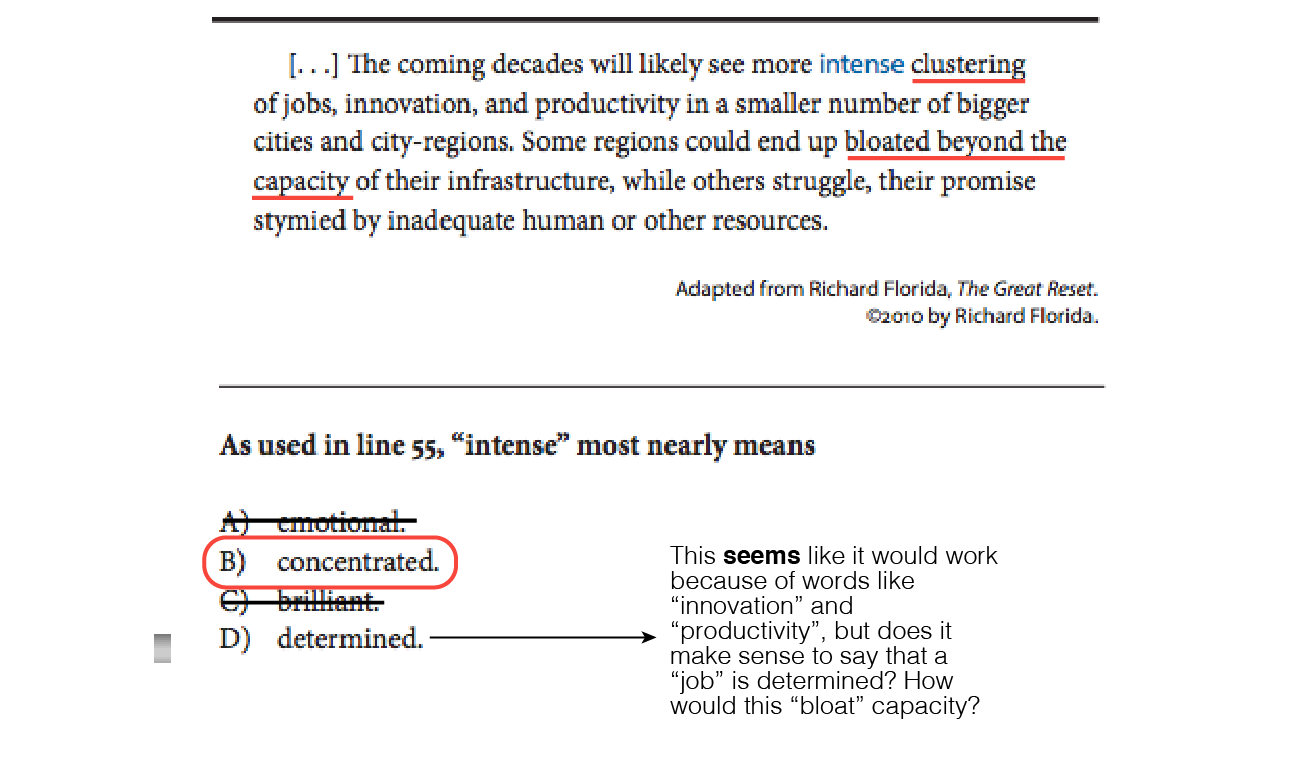Co-authored by Renae Hintze
Like most exams, although SAT and ACT test you on what you know, there is also an element of time.
For many of us, unlimited time on a test would give us the chance to thoroughly answer each question the way we wanted to… but because standardized testing times aren’t unlimited, instead it’s best to implement different strategies to help work against the time limit.
One of the best strategies to get a good score in shorter time is to guess!
Should you really guess on the ACT/SAT?
The answer is 100% YES.
Unless you truly know all the material, unless you have increased your test taking speed so that you spend the right amount of time on every question, save some time at the end of your exam to fill in empty bubbles.
Both the ACT and the SAT do not penalize for guesses. What that means is that the questions you answer wrong do not count against you.
When in doubt, follow this flowchart:
 Blind Guessing
Blind Guessing
Does it matter what letter I guess?
You may or may not have considered that a certain letter on the multiple choice is more commonly used than others. There is some question as to whether or not the letter “C” has the best chance of being correct.
Is this true?
Adam Lohonyai is a Forensic Structural Engineer who did a study on this exact question, and here are his findings:
In the long run, sticking with ‘C’ probably gives you a very slim advantage over random guessing, though guessing randomly gives you better consistency in the results of your guesses.
And if you’re not paying attention, bubbling in C last minute could cause you to miss out on your True or False questions, where only A and B are an answer!
My advice? When guessing, stick to a variety of guesses and don’t favor that “C”.
Making an Educated Guess
Making an educated guess means that you make inferences based on the material in the question to eliminate any answers that wouldn’t make sense and narrow down your options.
Here’s an example:
 Explanation:
Explanation:
Notice the clue words that are underlined in red. The words used around the unknown term can provide context to that term.
Let’s look at your options:
A) Emotional
This is most obviously not the correct term.
- The word is in front of a noun, which means it is most likely an adjective for the “clustering of jobs”. Does it make sense for a job to be “emotional”?
- There are no other words in the passage that indicate any kind of emotional ties to the jobs.
C) Brilliant
- Initially, you may have the thought that “Brilliant people do well in their jobs”… this is true, but this is not what is being said. The adjective “intense” is being used to define “clustering of jobs” not the people IN those jobs.
D) Determined
This is perhaps the closest to being right. However, consider this:
- How would a determined “clustering of jobs” cause a “bloated” capacity? Determination is not a size-related term.
Thus, the correct answer is most likely B) Concentrated!
You may see the word “concentrated” and think
How can that be right? Concentration means to focus.
But after narrowing down your options, you know that choices A and C are not likely to be correct.

Thick is a synonym for Large, which is a size-related term. That makes it most compatible with the term “capacity”.
Viola!
Conclusion
So to touch on a few points I mentioned above:
- Never leave blank bubbles on your ACT or SAT — fill them all in!
- When you are blindly guessing, don’t favor any one letter
- When you make educated guesses, use other clues in the question to weed out the best possible answer.
Did I answer all your questions about how to guess on the SAT and ACT? Tell us in the comments below!
Laura Petersen
Latest posts by Laura Petersen (see all)
- Score High: Evidence-Based Reading on the SAT - July 20, 2016
- How to Guess on the SAT and ACT - March 2, 2016
- 3 Reasons STEM Students Should Take the ACT - February 17, 2016
- What Does a Good SAT Essay Look Like? - January 26, 2015
- When Will I Get My SAT Scores? - December 1, 2014



Found your blog. Its really nice on admission counselling. I appreciate your
article. Its important to get quality Admission counseling that can help you to admission in established collages . So thanks for sharing all that important information.
Glad you liked it! Thanks for the positive feedback!
Todd,
VERY interesting information. I will be sure to share with our students. Thank you for the insight.